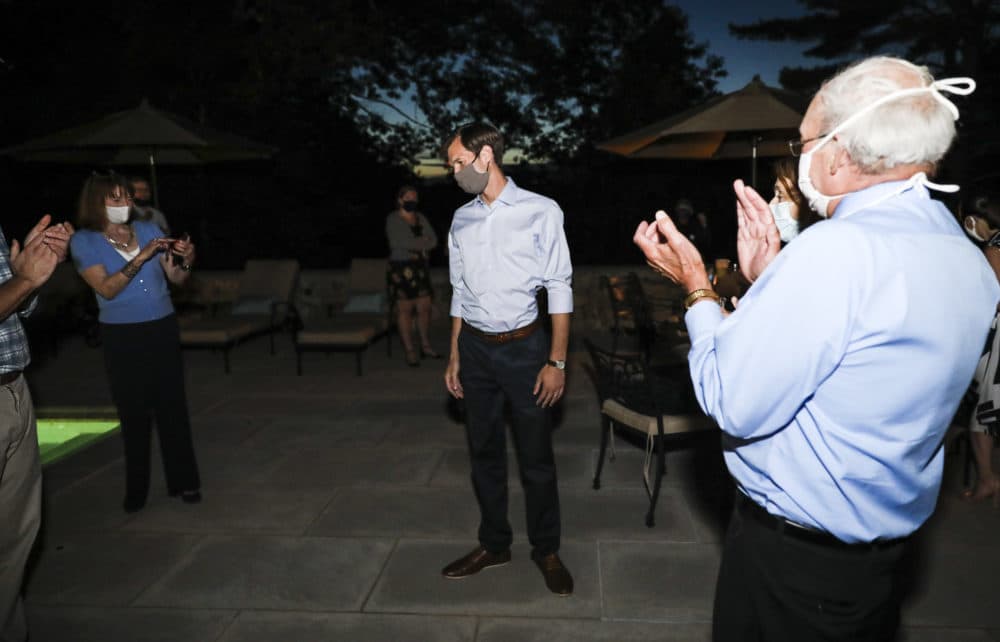Advertisement
Commentary
The Latest Argument For Ranked-Choice Voting? Last Week’s Primary

To the skeptics of ranked-choice voting: Look no further than last week's Fourth District Democratic primary elections, where Jake Auchincloss won the primary with 22.4% of the votes. Jesse Mermell was a close second, with 21.1% of the votes, and seven other candidates won between 1.6% and 18.1%.
The fact that a candidate who was the first choice for less than a quarter of those who voted will represent all of them should give us pause. Until Nov. 3, that is, when we should go to the polls and vote “yes” on Question 2 to bring ranked-choice voting to Massachusetts.
Since Auchincloss won fewer than half the votes, how do we know that he accurately represents the choice of the electorate? Perhaps those who did not vote for him or Mermell would prefer her over him if they knew their candidate had no chance of winning and they had a way to express this preference. Or they might support Auchincloss, thereby solidifying his win with an absolute majority. In fact, they might even coalesce around a third candidate, giving him or her more than 50% of the votes. With the way elections in our state — and most others — are conducted, we cannot know the answers to questions like these.
Most elections in Massachusetts, including the last week's in the Fourth District, use plurality voting, where a voter selects a single candidate. This method is a mathematical aberration. Since it asks for very little information from the voter, it is inherently coarse and fails to incorporate any of the nuances of voters’ preferences beyond their top candidate.
Why is this problematic? Plurality voting can result in situations such as vote-splitting, where two or more similar candidates divide the votes and allow a fringe candidate to rise to the top, or a "spoiler effect," where a candidate with no chance of winning takes votes away from a major candidate, precipitating their loss.
For example, polls suggest that Donald Trump won the Republican nomination in 2016 due to vote-splitting, since a vast majority of the people who voted for Cruz and Rubio would have preferred either of the two over Trump. Strikingly, up to seven, or 12%, of U.S. presidential elections might have been decided by the spoiler effect. (The 2000 Bush-Gore election was the most dramatic in recent history).
There is a solution. Ranked-choice voting, by which we usually mean the instant runoff method of tallying ranked ballots, eliminates these and a slew of other issues. Voters rank all the candidates in their order of preference, and the candidate with the fewest first-place votes is eliminated. The votes are re-tabulated, raising the candidates who were behind the eliminated candidate up in the rankings, and this process of elimination and re-tabulation is repeated until there is a candidate who earns more than half the votes.
The benefits of ranked-choice voting are manifold. In addition to preventing vote splitting and the spoiler effect, this method allows the voter to place a less popular candidate at the top without fear that she is “throwing away” her vote on someone who has no chance of winning; even if her top candidate is eliminated, her second choice will count — and this will happen all the way down her ballot. This, in turn, encourages participation of smaller parties and candidates from underrepresented groups who do not need to fear that they will cause splitting or act as spoilers. Ranked-choice voting also discourages negative campaigning and reduces the benefit of strategic voting.
The reasons we still use plurality voting have nothing to do with its merits but rather a lack of education and motivation to change it. This method has been around for a long time, it is simple, voters do not know that there are fairer methods and it favors two-party structures (Duverger’s Law), so there is no meaningful impetus from the highest levels of our government to eliminate it.
But the tide seems to be turning. Ranked-choice voting is currently used in many cities, including San Francisco, Minneapolis and the Commonwealth’s own Cambridge. New York recently voted to implement it in all city elections and Maine became the first state to use it in all primaries and general congressional elections. Massachusetts now also has a chance to adopt ranked-choice voting this November and remain a leader in equitable politics.
Encouragingly, more than half the state’s congressional delegation has already endorsed ranked-choice voting, along with other big Massachusetts political names like former Governors Deval Patrick and Bill Weld.
The critics of ranked-choice voting say that it is too complicated for the average voter. This condescending and convenient excuse is a common tool for validation of our defective self-governing practices. It ignores the possibility that people are, in fact, receptive to learning better ways to exercise democracy. And this is why topics at the intersection of mathematics and politics such as voting, apportionment of legislative seats and gerrymandering should be standard curricular content in our schools — from an early age.
With many states, including Massachusetts, rethinking civics education in their public schools, now is the time to make quantitative political literacy an educational priority. If we do, we will cultivate an electorate that is capable not only of understanding how ranked-choice voting works but of demanding that mathematically unsound democratic practices like plurality voting be eradicated. Only then will we really know whether Auchincloss and scores of other election winners are truly the choices of the people.
